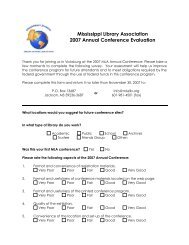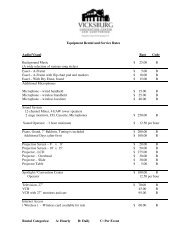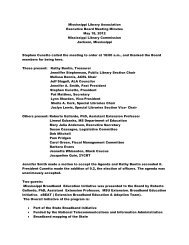Full Text (PDF) - Mississippi Library Association
Full Text (PDF) - Mississippi Library Association
Full Text (PDF) - Mississippi Library Association
Create successful ePaper yourself
Turn your PDF publications into a flip-book with our unique Google optimized e-Paper software.
Page 18 Vol. 75, No. 1, Spring 2012 <strong>Mississippi</strong> Libraries<br />
The Impact of School Libraries on Student<br />
Achievement and Success<br />
Katherine Parr<br />
Introduction<br />
“What do students need in order to succeed<br />
The latest research insists they need<br />
strong library programs. . . . There is one<br />
clear and consistent finding that is supported<br />
by most research: a school library<br />
media program with a full-time library<br />
media specialist, support staff, and a strong<br />
computer network leads to higher student<br />
achievement” (Hamilton-Pennell, Lance,<br />
Rodney, and Hainer, 2000, p. 45-46).<br />
Recent studies indicate that there is a<br />
direct correlation between school-wide<br />
success and an effective library media center.<br />
In order to run the most effective library<br />
media center, a library media specialist<br />
must have support from school administrators<br />
who have had proper training related<br />
to library specialists; collaboration with and<br />
cooperation from teachers in lesson planning,<br />
teaching, and collection development;<br />
and maintain flexible hours in the<br />
library to provide students with maximum<br />
hours of access to the media center. These<br />
characteristics, among others, should help<br />
the media center to improve student<br />
achievement on state tests and encourage<br />
lifelong learning.<br />
With recent budget cuts, especially in<br />
the state of <strong>Mississippi</strong>, librarians and<br />
media centers seem to be at increased risk<br />
of being eliminated. Gulfport High School,<br />
with 1800 students, lost a library media<br />
specialist to retirement at the end of the<br />
2009/10 school year. The district made<br />
the decision to keep only one librarian in<br />
that media center. Decisions such as this<br />
one are detrimental to the abilities of a<br />
media specialist to create a successful<br />
media center.<br />
Katherine Parr is a graduate student in the<br />
School of <strong>Library</strong> and Information Science at<br />
the University of Southern <strong>Mississippi</strong>; e-mail:<br />
KtParr@yahoo.com.<br />
Importance of the Study<br />
There are numerous studies that support<br />
the idea that an effective school library<br />
media center has a definite impact on student<br />
achievement. Despite this information,<br />
school districts continue to cut funding<br />
of libraries, even eliminating school<br />
libraries in some states. Some studies suggest<br />
that training of administrators should<br />
include information on the importance of<br />
an effective media center. If the supervising<br />
party does not understand the value of a<br />
media specialist, he or she will not appreciate<br />
the importance of the library media<br />
center in connection with school success.<br />
Unfortunately, there are not many studies<br />
specifically related to <strong>Mississippi</strong>. This<br />
study will focus on <strong>Mississippi</strong>, so that<br />
local professionals may have an additional<br />
tool by which to improve media centers.<br />
The main focus will be on the most effective<br />
practices to improve media centers<br />
and how librarians and administrators can<br />
best achieve the desired results.<br />
Characteristics of an Effective<br />
<strong>Library</strong> Media Center<br />
Dr. Keith Curry Lance is a well-respected<br />
researcher on the social impact of<br />
library media centers and also the former<br />
director of the <strong>Library</strong> Research Service at<br />
Colorado State <strong>Library</strong> and University of<br />
Denver. In his 2001 literature review of<br />
studies published on library media centers<br />
in Alaska, Pennsylvania, Colorado, and<br />
Oregon titled, Proof of the Power: Recent<br />
Research on the Impact of School <strong>Library</strong><br />
Media Programs on the Academic<br />
Achievement of U.S. Public School Students,<br />
he found that the most effective<br />
library media centers in the four states surveyed<br />
shared certain characteristics. They<br />
consistently had a professionally trained<br />
and credentialed library media specialist<br />
with the support of school administrators<br />
and teachers, the capacity to develop information<br />
literacy skills in students, and the<br />
ability to train teachers, principals and students<br />
in relevant technologies. The support<br />
staff could provide the librarian freedom<br />
to facilitate workshops and attend<br />
trainings and participate in meetings outside<br />
the media center. There was a school<br />
computer network that extended information<br />
resources outside the media center to<br />
classrooms, labs, and – in the best situations<br />
– students’ homes. Finally, Lance<br />
found that effective library media centers<br />
had the funding necessary to implement<br />
and maintain these development initiatives<br />
and purchase licenses to online databases<br />
for student access.<br />
Excerpts of a 2002 article written by<br />
Frances Roscello and Patricia Webster of<br />
the New York State Education Department<br />
titled, Characteristics of School <strong>Library</strong><br />
Media Programs and Classroom Collections:<br />
Talking Points were published by<br />
Scholastic in the Third Edition of School<br />
Libraries Work. In their study, Roscello<br />
and Webster found that effective school<br />
libraries are easily accessible, flexible in<br />
scheduling, cost effective, offer a broad<br />
range of materials that address the needs of<br />
all reading levels, and add new resources<br />
to the media center throughout the school<br />
year (Scholastic, 2008, p. 5). The same<br />
authors also emphasize the role of library<br />
media centers as catalysts for information<br />
exchange and student intellectual development<br />
and recommend that library media<br />
centers offer collaborative reading instruction<br />
programs, make materials available<br />
that promote reading motivation, provide<br />
free reading guidance, and select<br />
resources that support the learning needs<br />
of all students, enhance leveled classroom<br />
collections and support national/state<br />
learning standards (Scholastic, 2008, p.<br />
8).<br />
A quantitative study titled Survey of the<br />
Influence of <strong>Mississippi</strong> School <strong>Library</strong><br />
Programs on Academic Achievement:<br />
Implications for Administrator Preparation<br />
Programs by Thelma Roberson,<br />
William Schweinle, and Mary Beth Applin














